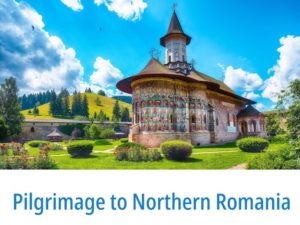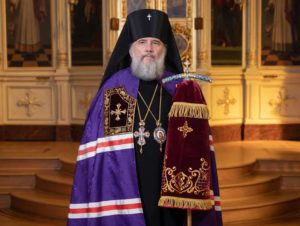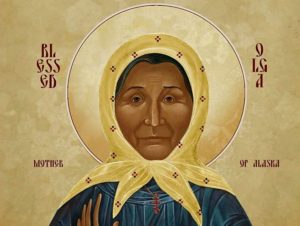This interview was conducted by the Communications Department of the Diocese of the Midwest with His Grace Bishop Daniel of Chicago and the Midwest. It covers a range of topics, including some of the most recent experiences that the bishop has had with his new diocese.
Your Grace, Master bless!
DOM COMS: I would first like to congratulate you on your election as the Bishop of Chicago and the Diocese of the Midwest — Axios! Thank you for allowing some time for us to ask a few questions and letting our audience at domoca.org become more familiar with Your Grace.
BD: The blessing of the Lord be upon you! Thank you. It’s a pleasure to be able to continue to connect with the clergy and faithful of the diocese in this way.
DOM COMS: Your Grace, by this point, many people have read or heard about your upbringing and the story of your coming to the Church. But since being received into the Orthodox Church, you have had many experiences working in many different areas of church life. Could you share with us some of those experiences and which one you feel has been the most influential?
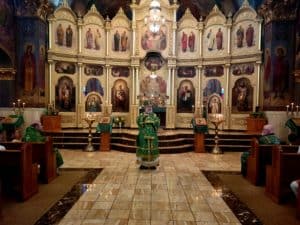 BD: As you said, I have been blessed with opportunities to take part in a wide variety of ministries with the Orthodox Church in America. These ministries include both pastoral and administrative roles and experiences. I have had times in my ministry in which there was more of an emphasis on administrative work, on both national and diocesan levels. I have been given the opportunity to serve on a number of committees and commissions and councils. A highlight of administrative work was when I served on the Statute Revision Committee, the group which produced the current OCA Statute which was adopted at the All American Council in Atlanta in 2015. And, while my chief desire and focus has always been to serve in a pastoral role, particularly in parishes, these times of administrative work were ultimately in service to the OCA, to the Dioceses (particularly the DOW), and to the priests and people in the parishes. So, with that in mind, I can say that I have always seen church administrative work to be pastoral, though not necessarily parochial. And I have learned through those experiences. But, your question relates to what experience has been most influential in my life. This is an easy one to answer, as, without a doubt, my years of pastoral ministry has been the most influential and formative on me. This is true for me both personally and spiritually.
BD: As you said, I have been blessed with opportunities to take part in a wide variety of ministries with the Orthodox Church in America. These ministries include both pastoral and administrative roles and experiences. I have had times in my ministry in which there was more of an emphasis on administrative work, on both national and diocesan levels. I have been given the opportunity to serve on a number of committees and commissions and councils. A highlight of administrative work was when I served on the Statute Revision Committee, the group which produced the current OCA Statute which was adopted at the All American Council in Atlanta in 2015. And, while my chief desire and focus has always been to serve in a pastoral role, particularly in parishes, these times of administrative work were ultimately in service to the OCA, to the Dioceses (particularly the DOW), and to the priests and people in the parishes. So, with that in mind, I can say that I have always seen church administrative work to be pastoral, though not necessarily parochial. And I have learned through those experiences. But, your question relates to what experience has been most influential in my life. This is an easy one to answer, as, without a doubt, my years of pastoral ministry has been the most influential and formative on me. This is true for me both personally and spiritually.
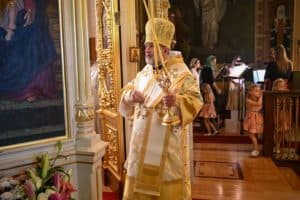 After I was first received into the Church, I spent several week at Saint Nicholas Church in Saratoga, CA. My first official assignment was at Saint Paul Church, Las Vegas, Nevada. I then was assigned to Saint Gregory Palamas Mission, then in Flemington, now in Clinton, NJ. After serving for a time at the national chancery in Syosset, NY, I was assigned to Saints Peter and Paul Church, Phoenix, AZ. I served that community for a little over seventeen years, first as a priest and then as a bishop during these past almost eight years, right up until the time of my election as Bishop of Chicago and the Diocese of the Midwest. I still have contact with the people I served in every one of those parish communities. And the reason I mention this is because being pastoral, being a pastor, means sharing life and faith with those you serve.
After I was first received into the Church, I spent several week at Saint Nicholas Church in Saratoga, CA. My first official assignment was at Saint Paul Church, Las Vegas, Nevada. I then was assigned to Saint Gregory Palamas Mission, then in Flemington, now in Clinton, NJ. After serving for a time at the national chancery in Syosset, NY, I was assigned to Saints Peter and Paul Church, Phoenix, AZ. I served that community for a little over seventeen years, first as a priest and then as a bishop during these past almost eight years, right up until the time of my election as Bishop of Chicago and the Diocese of the Midwest. I still have contact with the people I served in every one of those parish communities. And the reason I mention this is because being pastoral, being a pastor, means sharing life and faith with those you serve.
A priest cannot serve in a parish without having his life changed, even transformed… always, hopefully, for the better. So, to get back to your question, I have to acknowledge that parish life and parish ministry have had the most impact and been the most influential aspect of my years of ministry. And, for me, pastoral ministry on the diocesan level has continued in my years as an auxiliary bishop and will now continue as I begin to serve the priests and faithful of the Diocese of the Midwest.
DOM COMS: That’s all very interesting, and certainly significant work as well. God has now called you to the next chapter of service to His Church as a bishop, which you have been serving as for close to eight years — what is something that you have learned during this time as a bishop personally?
BD: Throughout these past years as a bishop, one of the most important personal things that I have learned is to be more patient with myself. People who know me would say that I am generally patient with others, but not so much with myself. But I have come to understand something that I already knew, and that is that I am unable to do or manage everything, even with the best of intentions. Rather, Christ works through everyone, even though the imperfect. And I am certainly that.
DOM COMS: Your Grace, you were elected as the Bishop of the Midwest only a couple of months ago — what has your impressions been of the diocese? What do you see as the biggest challenge?
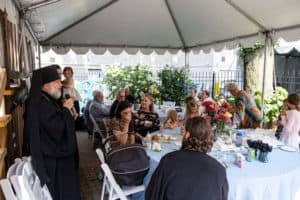 BD: I think I have learned a lot, but I also know that I have much more to learn. The Diocese of the Midwest, as the name implies, is comprised of the eleven states of the American Midwest. It includes over seventy parishes and missions. These communities are in some of the largest cities in America and also in some of the most rural of areas. Coming from a rural background myself, though having lived in large metropolitan areas, I value both. And, although there are differences of people and experiences throughout the diocese, the people are pretty much the same. The people are generally nice. Life can be slower, but not necessarily smaller. It’s “pop,” not “soda.” And a John Deere is a legitimate means of transportation.
BD: I think I have learned a lot, but I also know that I have much more to learn. The Diocese of the Midwest, as the name implies, is comprised of the eleven states of the American Midwest. It includes over seventy parishes and missions. These communities are in some of the largest cities in America and also in some of the most rural of areas. Coming from a rural background myself, though having lived in large metropolitan areas, I value both. And, although there are differences of people and experiences throughout the diocese, the people are pretty much the same. The people are generally nice. Life can be slower, but not necessarily smaller. It’s “pop,” not “soda.” And a John Deere is a legitimate means of transportation.
DOM COMS: I personally know from our past hierarchs that parish visits played such an important role in their ministry and the ability to be present and pray with each community. It brought them a lot of joy and ended up being their favorite part of their ministry. What are you looking forward to the most in visiting the churches of this vast territory?
BD: I am definitely looking forward to visiting the communities throughout this large diocese. Thesepastoral visits play an important and essential role for the chief shepherd of the diocese — to be with his people. Parish visits are key in the ministry of bishops, the shepherds of the flock of Christ. When I was a child living on our family farm, we often had shepherds graze their sheep on corn stalks in fields that had already been cut. They didn’t commute to work, but lived with the sheep they were caring for. As the Good Shepherd, Jesus Himself, says about His sheep in the Gospel of John: “I know mine and mine know me.” A good shepherd knows his sheep. And concerned and attentive bishop, in his role as shepherd, must know his sheep just they must know him. This can only happen if there is personal interaction, person to person communication. And this happens in dioceses mostly through the bishop’s pastoral visits to parishes.
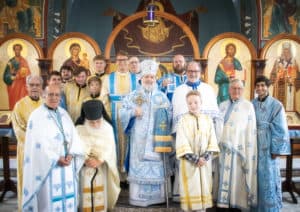 It does not surprise me one bit that the past bishops of this diocese made that a focal point of their ministry because they were great pastors. I look forward to continuing that tradition and legacy of the hierarchs of this diocese to be with my parishes as much as possible. With that being said, the size of the diocese does bring its own challenges, a reality of which I am becoming more and more aware from my own recent experience in the diocese, traveling to parishes. Even still, this is a high priority for me. Saint Ignatius of Antioch speaks of the people gathering around their bishop to manifest the Church in its fullness. It is an important part of the life of the Church, for bishops, and for clergy and faithful as well.
It does not surprise me one bit that the past bishops of this diocese made that a focal point of their ministry because they were great pastors. I look forward to continuing that tradition and legacy of the hierarchs of this diocese to be with my parishes as much as possible. With that being said, the size of the diocese does bring its own challenges, a reality of which I am becoming more and more aware from my own recent experience in the diocese, traveling to parishes. Even still, this is a high priority for me. Saint Ignatius of Antioch speaks of the people gathering around their bishop to manifest the Church in its fullness. It is an important part of the life of the Church, for bishops, and for clergy and faithful as well.
DOM COMS: Any final works or thoughts that you would like to share with our audience?
BD: I would like to thank Fr. Paul Jannakos, our Chancellor, and the administration of the diocese who put in many unseen hours. I would also like to thank the clergy and faithful throughout the diocese who have already welcomed me with warmth and the hospitality that is so typical of the Midwest. I would also like to invite and encourage as many people from the diocese as possible to attend the enthronement on October 1st at Holy Trinity Cathedral in Chicago. Not only do I believe that it is important for the diocese to be together as one family for this important event, but I truly count on the prayers of the clergy and faithful of this diocese to support and guide my ministry as their bishop.

